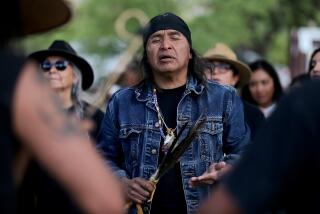One man’s fight against mountaintop removal
- Share via
Reporting from Peachtree, W.Va. — Few homeowners in Appalachia dare to stand up to coal companies. But Bo Webb did, and achieved the unthinkable: He forced a company to move blasting on a mountaintop-removal strip mining site away from his hollow.
Webb recently went to Washington, D.C., to press the government to shut down mountaintop removal — the practice of blowing up mountains to reach coal seams. Since May, Webb has worked as a leading organizer of Appalachia Rising, the first national mobilization against mountaintop removal.
Then last Monday, an estimated 2,000 people, including several hundred from Appalachia, marched in protest through the capital, from the Environmental Protection Agency to the White House, some with placards bearing the names of decapitated mountains. At the EPA, which enforces laws governing mountaintop removal, they trooped around the building shouting, “Do Your Job, EPA.”
Police arrested 114 people in front of the White House for acts of civil disobedience. A few protesters went limp and were dragged off.
Webb, 61, first heard about mountaintop removal soon after retiring in 2001 as a machine shop owner in Cleveland to move to Clay’s Branch hollow in the Coal River Valley of West Virginia. Webb had been raised in Clay’s Branch, part of a family that has lived been there since 1820.
One day he heard explosions and felt the ground shake from mining on Cherry Pond Mountain behind his house. Growing up, he had hunted wild turkey and gathered blackberries and ginseng in the forest there, a place of towering hardwoods, rushing streams and abundant wildlife. He decided to go have a look.
He was stunned. The mountain “was being blasted into a pile of rock and mud rubble,” he wrote in an open letter on the Internet to President Obama. Webb took a flight across the region in a small plane and saw mile after mile of obliterated peaks.
He eventually joined a community group that monitors mining, Coal River Mountain Watch, and later became head of its board.
Early last year, Massey Energy Co. started blasting directly above his home. One day, when rocks and debris flew toward his hollow and a boulder landed near his cousin’s home, he protested. But the state Department of Environmental Protection wouldn’t even “go up the holler with me and look at it,” he says.
Webb videotaped the area, took the tape to Washington, and showed it to the Office of Surface Mining Reclamation and Enforcement. Back home, three federal officials drove out and went up the mountain with him, and made state blasting personnel join them.
The state issued Massey four violations, two of them for blasting, including use of excessive explosives, and declared that if Massey blasted again in Clay’s Branch, it had to abide by special restrictions, such as videotaping the work for six weeks. The company has since kept away from the area.
Webb’s “relentless fight to save the mountains, communities, culture and people of Appalachia has inspired me more than I can ever describe,” says coal field activist Wendy Johnston.
For Webb, a former Marine and Vietnam veteran, the main point in fighting mountaintop removal is health. “They’re dying from high rates of cancer in Appalachian communities beneath these mountaintop removal sites,” he says.
“All up and down … Coal River, people have cancer.”
He rattles off the names of neighbors and others stricken with the disease, including two boys across the river: a 12-year-old who died last year and a 14-year-old who is dying.
“They’re killing us, and purposely,” he charges. “They want us out of here.” Activists have long maintained that Massey wants to pursue mountaintop removal without people around to slow it down.
“There’s no credible evidence of coal causing cancer,” responded Massey spokesman Jeff Gillenwater. He
called the idea of Massey purposely killing people in the community “outrageous.” He said the company had forced no one to leave, but had only bought out some homeowners at their request.
National Mining Assn. spokesman Luke Popovich called the notion of trying to drive people from parts of Appalachia “preposterous.” He said the infrastructure and employees that mining requires are only found in communities.
Webb remains undeterred, and he believes it’s now or never to end mountaintop removal. He doubts Obama will be reelected and thinks any successor will be much less sympathetic. “We’ve got two years to end this,” he says.
Slavin writes for The Times.
More to Read
Sign up for Essential California
The most important California stories and recommendations in your inbox every morning.
You may occasionally receive promotional content from the Los Angeles Times.










